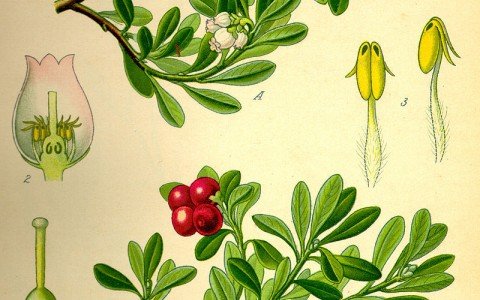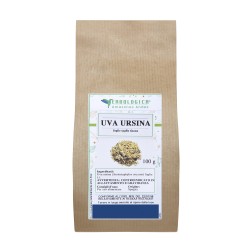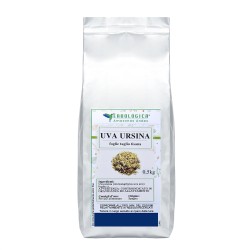
Le foglie di uva ursina sono state utilizzate per secoli come rimedio naturale per vari disturbi.
Dall'antichità ai giorni nostri, molte culture hanno utilizzato le proprietà curative delle foglie di uva ursina per trattare diversi problemi di salute.
Questo rimedio naturale sta diventando sempre più popolare grazie alla sua efficacia e alla mancanza di effetti collaterali.
Le foglie di uva ursina sono ricche di antiossidanti, hanno proprietà antinfiammatorie e possono aiutare a trattare infezioni del tratto urinario, condizioni della pelle e problemi digestivi.
Sebbene le foglie della pianta di uva ursina siano spesso trascurate, offrono una pletora di benefici per la salute che vale la pena di esplorare.
Introduzione alle foglie di uva ursina
L'uva ursina, nota anche come kinnickkeff e ribes nero, è una pianta appartenente al genere "Arctostaphylos" e alla famiglia delle eriche.
La pianta è originaria dell'emisfero settentrionale e cresce nella tundra artica, nelle regioni dell'Atlantico settentrionale e della costa del Pacifico.
Sebbene l'uva ursina si trovi per lo più allo stato selvatico, può prosperare in molti tipi di ambienti diversi.
Le foglie della pianta di uva ursina sono spesso utilizzate dagli erboristi per preparare tè, sciroppi, tinture, oli e unguenti.
La pianta dell'uva ursina prende il nome dagli orsi bruni che si nutrono delle sue foglie e bacche.
La pianta si trova spesso in zone con terreni ricchi di calcio, grazie al suo alto contenuto di calcio.
Le foglie dell'uva ursina sono ricche di antiossidanti e minerali e hanno proprietà antimicrobiche e antinfiammatorie.
Contenuto nutrizionale delle foglie di uva ursina
Le foglie della pianta di uva ursina sono un'ottima fonte di vitamine A, C ed E e una buona fonte di ferro, manganese, calcio, magnesio e zinco.
Una porzione di foglie di uva ursina contiene il 15% del valore giornaliero di vitamine A e C, l'8% di ferro e il 12% di calcio.
Le foglie sono anche una buona fonte di proteine: una singola porzione contiene circa 2-3 grammi di proteine.
Le foglie contengono anche una quantità significativa di fibre, con circa 6-8 grammi per porzione.
Le foglie di uva ursina sono anche una fonte di aminoacidi essenziali, polifenoli e flavonoidi.
Benefici per la salute delle foglie di uva ursina
Le foglie di uva ursina sono state utilizzate per secoli come rimedio naturale per vari disturbi.
Dall'antichità a oggi, molte culture hanno utilizzato le proprietà curative delle foglie di uva ursina per trattare diversi problemi di salute.
Questo rimedio naturale sta diventando sempre più popolare grazie alla sua efficacia e alla mancanza di effetti collaterali.
Le foglie di uva ursina sono ricche di antiossidanti, hanno proprietà antinfiammatorie e possono aiutare a trattare infezioni del tratto urinario, condizioni della pelle e problemi digestivi.
Sebbene le foglie della pianta di uva ursina siano spesso trascurate, offrono una pletora di benefici per la salute che vale la pena di esplorare.
Proprietà antinfiammatorie
Uno dei più importanti benefici per la salute delle foglie di uva ursina è rappresentato dalle loro proprietà antinfiammatorie.
Le foglie contengono un composto chiamato arbutina, che viene convertito in idrochinone nel fegato.
L'idrochinone è un potente agente antinfiammatorio in grado di ridurre il dolore e il gonfiore nel corpo.
Le foglie di uva ursina sono particolarmente utili per il trattamento di disturbi digestivi come IBS, colite, gastrite e sindrome dell'intestino irritabile.
Si ritiene che le foglie di uva ursina abbiano anche proprietà antinfiammatorie che possono essere utilizzate per trattare malattie della pelle come acne, psoriasi, eczemi e dermatiti. Si ritiene che le proprietà antinfiammatorie delle foglie riducano il rossore e l'irritazione della pelle, consentendo di ottenere una pelle più liscia e chiara.
Si ritiene inoltre che le foglie riducano la temperatura corporea, il che può essere utile per chi soffre di sudorazione eccessiva.
Proprietà antiossidanti
Gli antiossidanti sono composti che possono contribuire a rallentare il processo di invecchiamento e a proteggere l'organismo da varie malattie.
Le foglie dell'uva ursina sono ricche di antiossidanti che possono contribuire a ridurre il rischio di molti problemi di salute.
Uno dei benefici più evidenti degli antiossidanti contenuti nelle foglie di uva ursina è la loro capacità di trattare e prevenire vari tipi di cancro, come quello ai polmoni, al seno, alla prostata e al colon.
Le foglie di uva ursina possono anche contribuire a proteggere l'organismo da malattie cardiache, diabete, malattie neurodegenerative e ictus.
Le proprietà antiossidanti delle foglie di uva ursina possono essere utili anche per chi soffre di disturbi digestivi, come la sindrome dell'intestino irritabile e l'indigestione.
Gli antiossidanti presenti nelle foglie di uva ursina possono contribuire a ridurre l'infiammazione del tratto digestivo e a promuovere un sistema digestivo sano.
Trattamento delle infezioni del tratto urinario
Le proprietà antinfiammatorie e antibatteriche delle foglie di uva ursina possono essere utilizzate anche per trattare le infezioni del tratto urinario.
In effetti, i ricercatori ritengono che le foglie possano essere un trattamento più efficace degli antibiotici.
Le foglie di uva ursina possono aiutare a trattare le IVU riducendo la crescita batterica nel tratto urinario e uccidendo i microrganismi dannosi.
Le foglie possono anche contribuire a ridurre il disagio e il dolore del tratto urinario, offrendo un rimedio naturale e sicuro per le IVU.
Le proprietà antinfiammatorie e antisettiche delle foglie di uva ursina possono essere utilizzate anche per trattare altre infezioni batteriche nell'organismo.
Le foglie possono essere utilizzate, tra l'altro, per trattare infezioni della pelle, infezioni sinusali e herpes labiale.
Le foglie di uva ursina possono essere utilizzate anche per trattare disturbi digestivi come infezioni del tratto digestivo, ulcere, sindrome dell'intestino irritabile e bruciori di stomaco.
Trattamento delle malattie della pelle
Le proprietà antinfiammatorie e antisettiche delle foglie di uva ursina possono essere utilizzate per trattare diverse malattie della pelle.
Le foglie di uva ursina possono essere utilizzate per trattare l'acne e altri tipi di infezioni cutanee come foruncoli, impetigine e ulcere cutanee.
Le foglie possono anche essere utilizzate per trattare malattie della pelle come la psoriasi e l'eczema, caratterizzati da pelle secca e pruriginosa.
Le proprietà antinfiammatorie delle foglie possono aiutare a lenire la pelle irritata, mentre le proprietà antibatteriche possono uccidere i microrganismi dannosi e promuovere un ambiente cutaneo sano.
Le proprietà antinfiammatorie e antiossidanti delle foglie di uva ursina possono essere utilizzate anche per trattare malattie della pelle come rughe, macchie dell'età e scolorimento della pelle.
Le foglie possono essere utilizzate per preparare una maschera naturale per il viso che può aiutare a ridurre le rughe, prevenire le macchie dell'età e migliorare la struttura della pelle.
Trattamento dei problemi digestivi
Le proprietà antinfiammatorie, antisettiche e antiossidanti delle foglie di uva ursina possono essere utilizzate per trattare diversi disturbi digestivi.
Uno dei benefici più evidenti delle foglie di uva ursina è che possono essere utilizzate per trattare disturbi digestivi come il reflusso acido, l'ernia iatale e l'indigestione.
Le foglie possono aiutare a ridurre il reflusso acido promuovendo un sistema digestivo sano e riducendo gli acidi digestivi.
Le foglie possono anche essere utilizzate per trattare l'ernia iatale, una condizione in cui lo stomaco si schiaccia attraverso un foro nel diaframma.
Le foglie possono contribuire a ridurre i sintomi dell'ernia iatale riducendo la produzione di acido nello stomaco. Le proprietà antinfiammatorie delle foglie di uva ursina possono essere utilizzate anche per trattare la sindrome dell'intestino irritabile e la colite ulcerosa.
Le foglie possono essere assunte per via orale sotto forma di tè o sciroppo, che può aiutare a ridurre l'infiammazione del tratto digestivo e a promuovere un sistema digestivo sano.
Come usare le foglie di uva ursina
Le foglie di uva ursina possono essere utilizzate in vari modi per ottenere i loro benefici per la salute.
Possono essere consumate fresche, essiccate o come estratto. Le foglie possono essere consumate fresche o essiccate e possono anche essere utilizzate per preparare sciroppi, oli e tinture.
Le foglie fresche o secche di uva ursina possono essere consumate in insalata, aggiunte ai panini o trasformate in un frullato.
Le foglie possono anche essere aggiunte a tè, zuppe, stufati o altre ricette di cibi e bevande.
Le foglie di uva ursina possono essere trasformate in una tintura, immergendole in alcol o glicerina per alcune settimane o mesi.
Le foglie possono anche essere trasformate in un estratto facendo bollire le foglie in acqua.
L'estratto di uva ursina può anche essere aggiunto a creme e unguenti da applicare sulla pelle.
Possibili effetti collaterali delle foglie di uva ursina
Sebbene le foglie di uva ursina offrano molti benefici per la salute, possono anche essere dannose per chi soffre di allergie o disturbi digestivi.
Chi soffre di allergie dovrebbe evitare di consumare le foglie, poiché possono provocare una reazione allergica alla pelle e al tratto digestivo.
Anche le persone affette da disturbi digestivi dovrebbero evitare di consumare le foglie di uva ursina, poiché possono peggiorare i sintomi e favorire l'infiammazione del tratto digestivo.
Le foglie di uva ursina contengono acido tannico e antrachinoni, che possono essere dannosi per chi soffre di malattie renali o epatiche o di problemi gastrointestinali come ulcere, coliti e morbo di Crohn.
Le foglie possono essere dannose anche per chi è incinta o sta allattando, poiché si ritiene che le foglie riducano la produzione di latte.




-250x250.jpg)
